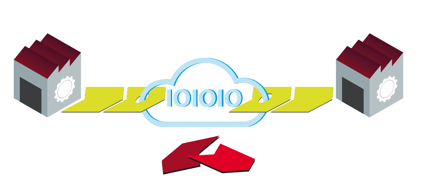How Industry 4.0 Reduces Supply Chain Disruptions
Nick Ostdick - June 06, 2017

 In such a variant-rich network with supply and distribution partners spread across all corners of the globe, the risk of disruption or breakdowns in planning and production programs is a constant struggle manufacturing companies must address. While cross-organizational data and information sharing, integrated planning and production sequences, and real-time visibility and insight into the overall supply situation are critical safeguards against large-scale disruptions, planners and managers have a critical took at their disposal in the form of Industry 4.0.
In such a variant-rich network with supply and distribution partners spread across all corners of the globe, the risk of disruption or breakdowns in planning and production programs is a constant struggle manufacturing companies must address. While cross-organizational data and information sharing, integrated planning and production sequences, and real-time visibility and insight into the overall supply situation are critical safeguards against large-scale disruptions, planners and managers have a critical took at their disposal in the form of Industry 4.0.
Industry 4.0 provides companies with a wide net in terms of troubleshooting or reducing instances of risk across a number of different kinds or brands. Because Industry 4.0 is a robust, holistic reinvention of more traditional manufacturing and supply conventions, companies who embrace this new platform will have a more powerful tool to combat a variety of risk factors in such a variant-rich environment.
What are the ways in which Industry 4.0 helps companies mitigate risk? How does Industry 4.0 help companies better understand their supply streams to avoid costly instances of error or potentially damaging production setbacks? With these questions in mind, let’s examine a handful of ways embracing Industry 4.0 helps automotive manufacturing companies reduce supply chain risk and execute more effective and profitable operational and production processes.
Enhanced communication between systems and people
If we think of Industry 4.0 as the evolution of the ‘smart factory,’ then it makes sense how the Internet of Things (IOT) and its reliance on the communication between machines and systems is a core driver in helping companies break down communication and functional silos to increase efficiency and productivity. This means the flow of information about inventory levels, facility capacity, or transportation routes is more consistent and allows for greater segments of the value chain to anticipate potential breakdowns or bottlenecks.
The ability of systems and solutions to work in conjunction with each other not only fosters greater productivity and accuracy, but it also provides greater visibilityinto a company’s overall supply situation. Because Industry 4.0 is in large part about making manufacturers more agile and responsive, the IOT becomes a core driver in creating valuable insight into a company’s demand planning, production, and inventory practices.
Incorporation of advanced analytics
We’ve discussed at length on this blog the benefits and advantages of advanced analytics in cutting the complexities of today’s global supply chain, and the adoption of Industry 4.0 is perhaps where advanced analytics proves most valuable in reducing risk. The ability to optimize production programs and processes is a critical driver for companies in maintaining high levels of productivity and efficiency, and advanced analytics gives planners and managers the data-driven insight to make informed decisions about planning strategies and planned production programs.
Industry 4.0 uses advanced analytics to support the push for greater end-to-end (E2E) visibility and increased supply chain agility, both of which are key in avoiding bottlenecks and creating stability across the entire value chain.
Customization as a value proposition
As we alluded to earlier, there’s no such thing as a ‘one-size-fits all’ solution in today’s global supply chain. Planners and managers require individualized solutions to challenges. As such, the customization of products is an increasingly frequent concern for manufacturers in a variant-rich industry with an increasing number of global players and partners. Industry 4.0 - alongside such production principles as additive manufacturing - allow manufacturers to enhance their customization capabilities to address the specific needs of individual customers. The ability to service this level of customization means companies will be more responsive to restraints in production programs and better equipped to weather potential breakdowns or slowdowns in the movement of parts throughout the supply chain.
Deployment of cloud technology
The Industry 4.0 supply chain is a data-driven enterprise where the insights gained from this data can be actualized to streamline processes at a variety of touch points across the value chain. As a result, Industry 4.0 demands a powerful platform for storing, sorting, and retrieving massive amounts of detailed data and reporting. Enter cloud technology and its ability to house large volumes of data with multiple access points for enhanced communication and collaboration across company channels. With vast amounts of storage space and the capacity to view and manage data in real-time, the integration of cloud technology is not only a key advantage in cutting the likelihood of risk, but it’s also an important component of the future of supply chain management.
The widespread introduction of Industry 4.0 in the automotive supply chain has been a truly disruptive force for planners and managers in rethinking how they conceive of intelligent supply chain management. With an emphasis on lean manufacturing principles, Industry 4.0 can not only push companies to achieve enhanced benchmarks for success, but it can also help companies minimize the inherent risks in global supply chain management.
LATEST POSTS
- Understand Circular Economy in The Manufacturing Industry
- How Can Industry 4.0 IT Integration Be Achieved Smoothly?
- The Significance of Order Sequencing in Discrete Manufacturing
- How to improve your Supply Chain Management: The Power of Control Towers
- Optimizing Human Resource Scheduling in Manufacturing: A Technological Approach



